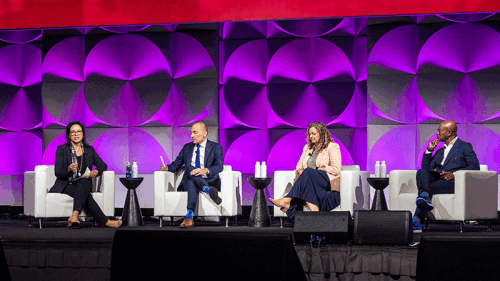Alibaba’s ambitious City Brain project in Hangzhou—the city where the Chinese tech giant is headquartered—is already using big data, sensors, and artificial intelligence (AI) to reduce congestion in the growing city, said a speaker at the ULI Asia Pacific Summit 2019 in Shanghai. It is now being implemented in other cities in Asia and could be used to drive development decisions for city government in the future. Wang Jian, chairman of Alibaba Group’s technology committee, gave an overview of how the system is working in a keynote address.
Prior to the system being installed, Hangzhou was one of the most congested cities in China. There are 2.8 million cars in the city, which has a population of 7 million. Headline data suggested that 1.3 million to 1.8 million cars were used each day. However, Wang said, knowing how many cars are used over the course of a day is no help at all for congestion management. The city needs to know how many cars are on the road at a given point in time. Using big-data gathering techniques, the City Brain project found there were only 200,000 cars on the road, on average, at any given time of day. At rush hour, when the congestion was worst, that average number increased, but only to 300,000. At no point did the number of cars on the road exceed 400,000.
Day 2 of ULI Asia Pacific Summit Shanghai! happening now: Dr. Wang Jian - Chairman of Technoloy Steering Committee at Alibaba speaking on the Relationship between Technology and City! #ULIAPSummit #ULI #uliasiapac #realestate #shanghai pic.twitter.com/JPRTKlpOSs— Harly Geraldine Pow (@harlypow) June 12, 2019
Using data on car numbers and movement, AI has been able to radically reduce congestion by adjusting traffic-light sequences at key times in order to account for the higher or lower numbers of cars on the road. The change has been dramatic: Hangzhou was once in China’s top three most congested cities; now it is barely in the top 80, said Wang. The system has other benefits, too. Ambulances in Hangzhou no longer need to run red lights—the system can identify an ambulance heading to an emergency and switch traffic signals in order to allow it unimpeded progress.
The City Brain is also being used to help Hangzhou use its parking spaces more efficiently and to increase automation in city parking garages. Tourists ought to be able to get to any of the city’s prime attractions on public transport with no more than one change, he said.
Wang said that electric and autonomous cars would not necessarily reduce traffic—autonomous cars would have to be intelligently managed to do so, he said. In trying to prevent congestion, neither autonomous vehicles nor public transport were panaceas, he said; it was the management of vehicles on the road that counted. However, Wang added that he would be in favor of moving to having car-free cities, not least because roads take up 25 percent of a city’s space, which could be used in other ways.
The City Brain technology has been exported from Hangzhou to five other Chinese cities, including Suzhou, and last year it was launched in Kuala Lumpur, Malaysia.
“If a technology can’t solve an existing problem that the city has, it’s not a good technology” to introduce, says Dr. Jian Wang on “Rethinking the Relationship of Cities and Tech” keynote at #ULIAPSummit @ULI_AsiaPac pic.twitter.com/xq7hK9gJa0— Kevin Hsu (@earthsys) June 12, 2019
Rather than tracking human progress via industrial revolutions, Wang prefers to focus on networks. First, the road network, which increased human interaction across distances; then, the advent of electricity, which formed the basis for the modern city; and now the era of computing, which will drive city development in the future, he argued. “We are only in the early stages of the computational era,” he said. Infrastructure development in the future will be driven by data.
Wang predicted that city management systems would become truly intelligent in time, but reassured a slightly concerned audience—a show of hands found that the vast majority were uncomfortable with the idea of an intelligent system running their city—that this would not be human self-awareness, but rather a different sort of intelligence suited to its purpose, “like a bug brain,” he said. Wang also pointed out that technological change is usually resisted in its early stages. “When electricity was first introduced, people were scared of it,” he pointed out.

